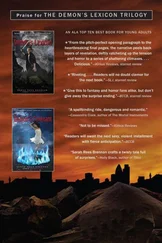Sarah Brennan - The Demon's Covenant
Здесь есть возможность читать онлайн «Sarah Brennan - The Demon's Covenant» весь текст электронной книги совершенно бесплатно (целиком полную версию без сокращений). В некоторых случаях можно слушать аудио, скачать через торрент в формате fb2 и присутствует краткое содержание. Жанр: Старинная литература, und. Описание произведения, (предисловие) а так же отзывы посетителей доступны на портале библиотеки ЛибКат.
- Название:The Demon's Covenant
- Автор:
- Жанр:
- Год:неизвестен
- ISBN:нет данных
- Рейтинг книги:4.5 / 5. Голосов: 2
-
Избранное:Добавить в избранное
- Отзывы:
-
Ваша оценка:
- 100
- 1
- 2
- 3
- 4
- 5
The Demon's Covenant: краткое содержание, описание и аннотация
Предлагаем к чтению аннотацию, описание, краткое содержание или предисловие (зависит от того, что написал сам автор книги «The Demon's Covenant»). Если вы не нашли необходимую информацию о книге — напишите в комментариях, мы постараемся отыскать её.
The Demon's Covenant — читать онлайн бесплатно полную книгу (весь текст) целиком
Ниже представлен текст книги, разбитый по страницам. Система сохранения места последней прочитанной страницы, позволяет с удобством читать онлайн бесплатно книгу «The Demon's Covenant», без необходимости каждый раз заново искать на чём Вы остановились. Поставьте закладку, и сможете в любой момент перейти на страницу, на которой закончили чтение.
Интервал:
Закладка:
“Really. I hope it doesn’t turn into strep throat, like it did the last time the college held a rave.”
That was when Mae saw the battered car pull up outside the gates. They’d got a new car since the last one had been abandoned on Tower Bridge, but she knew it was them.
It didn’t look like a vehicle for people who knew magical secrets. It was blue and scarred, and the brown tracery of age webbed across the door on the driver’s side reminded Mae of the lines in the corners of an old man’s eyes. The car was framed in the black and gold gates, and a sycamore tree was dropping yellow star shapes on the battered roof. To anyone else’s eyes the view from her window would have seemed utterly ordinary.
The passenger door opened and Mae saw Alan emerge, moving stiffly, sunlight catching the gold gleams chased through his dark red hair.
She realized she was clutching the phone too hard. She switched it to her other hand and tried to flex her fingers; they seemed to want to stay curled in the shape they’d formed around the phone.
“Um, yes! I’ve been coughing and coughing,” she said randomly into the phone.
“I’m sorry?” said the secretary, very dry. “I thought this was Mrs. Crawford.”
“I think I may have caught what Mavis has,” Mae told her, and coughed. “Those soirees are hotbeds of disease. Excuse me. I have to go.”
She missed when she tried to hang up the first time, then gave her hand a betrayed look and hung up like a reasonable human being. The intercom buzzed, and she smacked the button to open the gates without looking at it. She was still staring out the window.
Alan limped toward the front door. The limp was the first thing she’d noticed about Alan, back when he was just a boy working in her local bookshop who went pink every time she spoke to him. It was only a small halt in his step, he didn’t let it affect him much, but he also let people see it because the limp made him look harmless. It was the perfect camouflage, because it was real.
Alan’s brother followed him, always walking one step behind or one step in front, either guarding him or watching his back. Mae didn’t think it would ever have occurred to Nick to walk alongside anyone: He would’ve thought being beside someone just for company was pointless.
Nick never looked harmless. He never tried.
Alan’s limp seemed much worse when Nick was near him. Nick moved like river water in the night, in sinuous flowing movements the eye always registered a second too late. He had a grace that was terrible to watch: He moved, and a voice in your head whispered that if he went for your throat, you wouldn’t even see him coming.
Mae could feel her heart beating too fast and her cheeks burning. She was furious with herself for being such an idiot.
She went downstairs and told herself with every step that she was fine, that she had called them because she needed help, that she hadn’t particularly wanted to see either of them. She prepared a number of calm and practical things to say.
When she opened the door and saw their faces, she forgot them all.
She and Jamie had lived with them for over a week; their faces were as familiar to her as old friends’, but she hadn’t seen them since the day she’d killed someone and they’d found out the truth about Nick. They looked different to her, new even though they were familiar, and she felt new as well, as if she’d been broken apart and put back together with the pieces not fitting quite right. They were real. It was all real, that world of magic so different from the world of Exeter. They were a part of magic and danger and the blood she woke remembering every night.
“Hi,” she said, and opened the door to let them in.
“It’s good to see you again, Mae,” said Alan, and gave her a hug.
She was startled not so much by the gesture as by how it felt. It made her recall her first impression of Alan, when she’d seen a skinny but sort of cute redhead with kind eyes behind wire-rimmed glasses and thought that he seemed nice, harmless, and not at all her type.
She knew better now, but there was still a moment of complete cognitive dissonance when he put his arms around her. He looked like one thing and felt like quite another.
His chest and arms were surprisingly hard, lean muscle against her hands, and under his thin T-shirt he was carrying a gun. Mae felt the shape of it press briefly against her stomach.
Alan wasn’t harmless. He didn’t mind if she knew it.
For a moment she didn’t even think to return the hug, just stood there frozen. He’d started to pull away by the time she curved a hand around his shoulder, and there was an awkward instant where she grabbed him and he stepped back in too close and then they both stepped away too quickly.
She wasn’t expecting a hug from Nick. She didn’t even get a hello.
He leaned against her door with his arms folded and nodded at her. When she suggested they come inside he followed them into the sitting room, always one step behind, carefully shadowing his brother.
Mae couldn’t stand how ridiculous and off balance she felt, and took the desperate measure of being her mother’s daughter and playing hostess. “Sit down,” she said, and pinned a smile in place like a badge. “Can I get you guys anything? Juice? Tea?”
“I’d love some juice,” said Alan.
Nick shook his head.
“What, you don’t talk anymore?” snapped Mae, and wanted to bite her tongue out.
“I talk,” said Nick, his mouth curving slightly. “And I see you still pester people.”
He had a deep voice that reminded Mae of a fire; a low, dangerous sound that crackled occasionally and made you jump. Listening to Nick talk was like seeing Alan walk. It was always obvious there was something wrong.
“It is one of my favorite activities,” said Mae, and went to get Alan some juice.
When she came back, she found Alan sitting in an armchair by the fireplace like a proper guest. Nick was roaming the room as if he was a feral dog she’d shut up in the house and he was searching for signs of danger and getting ready to bolt. He was stooped over the grand piano and he looked up, not startled but wary as she entered the room. Mae took a quick, instinctive step back and her free hand found the doorknob, her palm suddenly sweaty against the cool juice glass.
She’d always been a little jolted when she met Nick’s eyes, and it was worse now she knew why. His gaze was steady, his eyes not the windows to any soul but to another world, a world with no stars or moon, no possibility of light or warmth.
Then he looked down at the piano keys and was again simply the best-looking guy she’d ever seen, with lashes lying feathery on high cheekbones, a sooty shock of hair such a dense black that it didn’t shine but always looked soft, and a full mouth that should have been expressive but somehow never was.
“Do you play?” she asked, and felt stupid and enraged. She never usually felt stupid.
“No,” said Nick in that low, emotionless voice. She thought that was all he was going to say, since he was always careful with words, acting as if he had a very limited supply and might run out at any moment. But he added, “Alan used to. When we were kids.”
“Ages ago,” Alan put in, his voice very light. “I was also on the football team and I played the guitar. But where I really shone was my work on the tambourine.”
He didn’t say that that had been before their father died and before Alan had been crippled, when they’d had money. Mae held on tight to the doorknob and felt embarrassed by her whole house.
“We could get a piano,” Nick said.
“And what, keep it in the garden?” Alan made a soft sound, almost a laugh.
“We could get a bigger place. You could play the piano. You could play football. We can do anything we like —”
Читать дальшеИнтервал:
Закладка:
Похожие книги на «The Demon's Covenant»
Представляем Вашему вниманию похожие книги на «The Demon's Covenant» списком для выбора. Мы отобрали схожую по названию и смыслу литературу в надежде предоставить читателям больше вариантов отыскать новые, интересные, ещё непрочитанные произведения.
Обсуждение, отзывы о книге «The Demon's Covenant» и просто собственные мнения читателей. Оставьте ваши комментарии, напишите, что Вы думаете о произведении, его смысле или главных героях. Укажите что конкретно понравилось, а что нет, и почему Вы так считаете.











